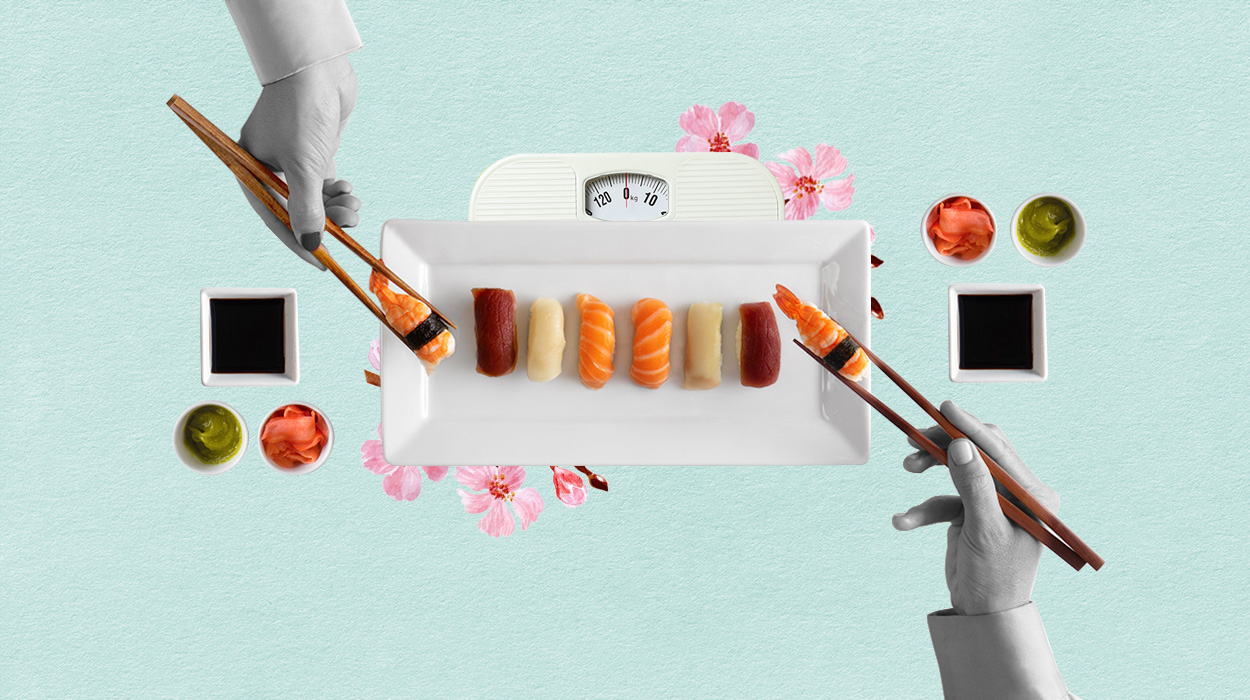Is sushi good for weight loss? From shrimp rolls to spicy tuna, find out if this popular Japanese food will help you lose weight in 2024.Sushi is a traditional Japanese food consisting of thinly sliced fish and small pieces of vegetables wrapped in seaweed and sushi rice. These ingredients are rolled into a cylinder shape and cut into six or eight pieces. They are usually referred to as sushi rolls. Sushi often comes with wasabi, Japanese horseradish, soy sauce, and sliced pickled ginger.
Sushi can be extremely healthy, but is sushi good for weight loss? Yes, it can be. Sushi can be a good food to consume while dieting; however, the sushi preparation and ingredients matter. Those looking to lose weight should choose their sushi vegetables and fish, dipping sauces, and preparations carefully in order to keep it a weight-loss-friendly dish.
Is Sushi Good For Losing Weight?
It can be. Sushi combines various small portions of fish and vegetables, usually wrapped in seaweed and vinegar rice. Depending on the type of sushi roll, the ingredients can be either raw or cooked. Made with fish and vegetables, sushi is generally a low-calorie food.
However, some sushi is fried, which can be fattening. Also, consuming too much rice may hinder weight loss efforts. So, is sushi good for losing weight? When it comes to sushi for weight loss, it’s best to consume in moderation and choose ingredients wisely.
Is Sushi Good For Weight Loss?

Eating sushi is good for weight loss if you prioritize raw or steamed ingredients and choose modest portion sides.
Many sushi rolls contain vegetables such as cucumber, mushroom, avocado, sweet potato, carrot, and daikon radish. Vegetables have very few calories, making them a staple of any healthy weight-loss diet. However, when vegetables are made tempura, they are dipped in batter and deep fried. Fried foods have significantly more calories and can contribute to weight gain.
Similarly, common sushi fish include tuna, salmon, shrimp, mackerel, yellow tail, and eel. These fish contain protein and omega-3 fats but no carbohydrates, making fish an excellent weight-loss choice. Eating raw or steamed fish is more beneficial for weight loss than eating fried fish.
If you skip the fried ingredients, then yes, sushi is good for cutting weight. However, don’t forget those flavorful side dishes and garnishes – they may also assist in weight loss and offer other health benefits.
Wasabi, the spicy, pungent green paste that comes with sushi, may help promote weight loss. Some studies show that compounds found in plant-based foods like wasabi may suppress the development of fat.
Ginger is another common garnish on sushi plates that contains chemical properties that may help reduce body weight.
What’s In Sushi?
Traditional rolls have various ingredients, such as vegetables and fish, wrapped in a thin slice of seaweed. Outside of that layer is a thin vinegar rice coating with a little sugar and salt added to it. Some sushi rolls invert these layers, putting the rice inside and the seaweed outside. However, the vegetables and fish are always on the inside.
There is usually at least one vegetable and one type of fish inside the sushi roll unless it is vegan—vegan rolls contain no fish.
If you open any Japanese restaurant menu, you’ll find dozens of other options for different sushi rolls. Additionally, many restaurants accommodate special requests to add or remove certain ingredients — you can create your own roll!
What Sushi Is Good For Weight Loss?

So, is sushi good or bad for weight loss? To answer that, we’ll need to get more specific. It depends on the type of roll and how the ingredients are prepared. Some sushi is good for weight loss, whereas others are not as beneficial.
For example, a Philadelphia roll has cream cheese in it. There are roughly 350 calories in 100 grams or half a cup of cream cheese.[8] While the average Philadelphia roll may contain less cream cheese than this, it still will provide more calories than a raw vegetable roll.
It may be helpful to use a calculator to determine how many calories you should eat in order to lose weight. This will depend on your weight loss goals, sex, state of health, and starting weight.
Below are some of the best sushi rolls for weight loss:
- Salmon or Tuna Roll with avocado, cucumber, and carrots.
- Avocado Roll.
- Vegetarian Sushi Roll.
- Shitake Cucumber Roll.
- Sweet Potato Roll.
- Rainbow Roll.
- California Roll.
- Eel Avocado Roll.
How To Avoid Weight Gain While Eating Sushi
Sushi is not necessarily bad for weight loss. However, depending on how sushi is prepared, what additives are in it, and how much you eat, it may cause you to gain weight rather than lose it.
Here are a few tips to help you eat sushi without gaining weight:
Focus On Vegetables And Fish
Weight loss diets generally recommend reducing your calories to lose weight, and vegetables have fewer calories than most foods, including rice.
When ordering sushi, load up on vegetables and enjoy thinly sliced raw fish, but consume rice in moderation.
Avoid Tempura
Anything that has been deep-fried in tempura batter will increase the calorie count. When ordering sushi, opt for raw or cooked vegetables and fish, but avoid anything labeled tempura.
Skip the Sauce
Some sauces, such as teriyaki sauce, contain added sugar. Added sugar can contribute to weight gain and should be avoided if you’re on a diet. You can ask servers to put the sauce on the side so that you can add smaller portions of it to your sushi.
Eat Sushi In Moderation
While you can eat vegetables in abundance and likely not gain weight, having too much rice can add up. When eating sushi, opt for modest portions, such as six or eight pieces. Alternatively, you can eat sashimi instead of sushi to limit the amount of rice you consume.
Ask For Brown Rice Instead Of White Rice
Brown rice has roughly one more gram of fiber than white rice. Although this may not seem like a lot, it can make a difference for some people trying to lose weight. Having adequate dietary fiber can aid in weight loss due to fiber’s ability to increase satiety.
Eat A Salad First
You can help your weight loss efforts by eating a salad or other vegetables before you eat sushi. Studies have shown that the order in which you eat your food matters. Namely, eating carbohydrates like rice last and eating vegetables first can better stabilize blood sugar.
People who tend to eat fast have a greater risk of obesity. However, studies indicate that when people eat vegetables first, it doesn’t matter as much whether they eat fast or slow — their blood glucose levels remain the same as long as they start their meal with vegetables.
For this reason, eating vegetables before carbohydrates is advised for people with type 2 diabetes because of the positive effects on insulin and glucose levels. Having more stable blood sugar means increased satiety for longer periods.
Focus On Other Healthy Habits
Aside from tweaking your sushi eating habits, it’s best to approach weight loss holistically. For example, if you want to lose fat and gain muscle, it’s essential to focus on strength training in addition to maintaining a healthy, well-balanced diet.
Hydration is another key aspect of weight loss; however, how much water you should drink a day to lose weight varies from person to person. An active person will likely need more water to replenish what they sweat out during exercise. Aim for at least six to eight glasses of water[18] per day.
Furthermore, try to consume less alcohol. Alcohol consumption has been linked to weight gain and obesity. Alcohol can contribute to weight gain in a number of ways, one of which is interrupting healthy sleep patterns. Getting enough sleep is crucial for weight loss.
More specifically, sleep deprivation has been linked with weight gain. Without adequate sleep, appetite and food intake can increase, hindering weight loss efforts.
If you are eating, exercising, sleeping, and hydrating well and still need a little extra weight loss support, consider taking a weight loss supplement or a fat burner. However, do not start taking any supplements for weight loss without first consulting with a healthcare professional.
Conclusion
Sushi offers many nutritional benefits, and it can be good for weight loss, but much of this comes down to the ingredients in the sushi rolls and how they are prepared. Sushi is primarily made of three main foods: rice, vegetables, and fish or meat.
Consider having less rice and more vegetables for better results on your weight loss journey. You may opt for sashimi instead of sushi rolls to avoid rice altogether. Don’t forget to load up on wasabi and ginger, which can promote weight loss. When choosing your ingredients, try to avoid anything that is tempura and avoid eating too much sauce. Finally, enjoy sushi in moderation!
Frequently Asked Questions
Mackerel rolls, rainbow rolls, salmon cucumber rolls, vegetarian rolls, and shrimp rolls are good choices for weight loss.
It depends on how the sushi is prepared and what ingredients are in it. Tempura means it is deep-fried, and most sushi sauces contain sugar. But, if you get raw sushi and vegetables without sauce, it can be a healthy meal.
Salmon avocado, spicy tuna, maki rolls, shrimp cucumber, and vegetable rolls are some of the healthiest types of sushi rolls.
There’s no exact limit of sushi to stick to while dieting. This will depend on your personal weight loss goals. However, sticking to six to eight pieces of sushi in one sitting is generally a good amount for a light meal while on a diet.
Either raw or cooked fish is fine for weight loss. Cooking fish does not change its nutritional makeup unless it is fried. If you get your fish cooked, opt for steamed rather than fried.
This is not advisable. While sushi can be part of a weight loss diet, it should not be the only food you consume. Eating only sushi could cause you to lose essential nutrients from other types of food.
Try to avoid tempura or fried rolls, and avoid eating too much teriyaki sauce due to the high sugar content. Also, eat mostly vegetables and fish, and minimize rice intake.

